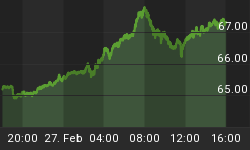It is our belief that the dollar will decline meaningfully for many reasons including the following: 1. the exploding US budget deficit; 2. the government's reliance on foreigners to fund this deficit; and, 3. interest rates will remain at 0% due to the weak economy making it difficult for the US to attract capital. However, there is a misperception that that the US can manage its way through a housing and credit bubble without the Dollar collapsing (because we are America). Two flawed arguments are consistently raised to support that misperception. First, that there is no substitute for the Dollar as the global reserve currency, and second, that China cannot sell its Dollar holdings nor stop funding US deficits because it needs to support American consumption of Chinese products. Our commentary this week will counter these two arguments.
Number One: There are no substitutes for the Dollar as the global reserve currency.
Our Counter Arguments:
-
Lenders to the US decide whether the Dollar is the reserve currency - The US government consistently claims that it has a strong Dollar policy and that the Dollar will continue to be the world's reserve currency. However, other countries decide whether to hold and use the Dollar, rather than that decision lying in the hands of the US. Recent headlines have broadcasted our creditors' concerns about our debt levels and their tremendous exposure to Dollar holdings. When the US had savings and surpluses it was logical for foreign countries to support the Dollar as a reserve currency and to want to own US assets. Unfortunately, the financial strength of the US is no longer what it was forty years ago. Today, we are the world's largest debtor. Therefore, as countries are now reducing their Dollar holdings, the Dollar is losing its role as the world's sole reserve currency.
-
Paper currencies ultimately fail - Thousands of paper currencies have existed over time yet only 182 official currencies exist today. There is reason to believe that all existing currencies will also fail or lose all value through inflation, such as the Dollar or any other currency. Paper currencies fail because currencies backed by nothing allow countries to take on more debt than can be repaid, leading governments to inflate away their debts and thus destroy the purchasing power of their currencies. These are precisely the actions the US is taking today.
-
US GDP is a large percentage of global GDP, yet our population is small - US GDP, as per the International Monetary Fund, was 23% of the world's total GDP in 2008. In contrast, our population of approximately 300 million is just 4.5% of the world's population of 6.7 billion people. If the United States had large savings and surpluses, then 4.5% of the world's population having 23% of global GDP could be possible. However, given our sizable deficits and the bubble economy of the past ten years, the United States' GDP as a percentage of the total global economy is overstated. This disequilibrium results from an overvalued currency. If the Dollar were to fall as a result of foreigners selling Dollars and Treasuries, interest rates in the US would rise and our GDP would fall to a percentage that more closely correlates to our share of the global population.
-
Military strength is a paradox - Some people argue that the strength of the US military supports the use of the Dollar as the world's reserve currency. However, given that we are running a $2 trillion deficit this year, the US is not funding its armed forces, but rather China, Japan and our other creditors are footing the bill. If foreigners stop buying Dollars, let alone sell them, our currency will collapse and with it, our military strength. During Rome's supremacy through the 300s A.D. the world allowed Rome to borrow more than it could repay. As Rome's economic strength declined its military might quickly followed. Military strength is enabled by a strong balance sheet. Thus, having a strong military today does not ensure a strong military in the future.
Number Two: China must continue to buy US Debt because China's producers depend on American consumers.
Our Counter Arguments:
-
A) China sells goods that the world wants - China primarily sells consumer goods to the US ranging from toasters to televisions. These are goods that not only US citizens want, but everyone around the world wants including the Chinese. Chinese manufacturers are indifferent as to which country their customer is located - they will sell to the highest bidder. Currently, the highest bidder is determined by relative values of paper currencies. If the Chinese RMB were to appreciate in value against the Dollar, then very quickly, many of America's 300 million people would lose their ability to buy goods from the Chinese. However, in this scenario, Chinese manufacturers would gain customers because over 1 billion Chinese consumers would gain purchasing power to offset the void left by 300 million Americans.
-
The US cannot afford what China is producing - Even if it were true that only Americans wanted goods that the Chinese produce, the Chinese should only use their labor to produce goods for those who can afford them. If America had large savings then it would be sensible for China to run large trade surpluses with the United States in order to sell us goods. Under the current scheme, China is promoting our debt-based consumption by lending us greater and greater amounts of money that we can not repay.
Summary:
Investors hate the phrase "this time is different." Every country that has pursued the steps that the United States is embarking upon has fallen on hard times and either gone bankrupt or faced hyperinflation. In light of the likely outcome for the Dollar, investors who believe that the Dollar will retain its purchasing power, let alone remain the global reserve currency, would truly be saying that this time is different.















